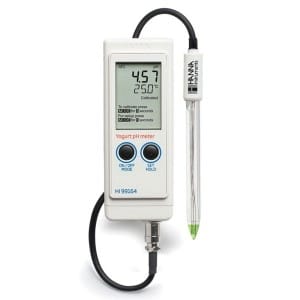
Hanna Instruments-99164 Portable pH/Temperature Meter for Yogurt Analysis
The Hanna Instruments-99164 features automatic calibration at one or two points with two sets of buffers. All calibrations and measurements are automatically compensated for temperature variations due to the internal temperature sensor in the FC213D electrode.
The split level LCD displays both pH and temperature readings, along with indicators for reading stability, battery percentage and calibration instructions.
Key features
- Application specific electrode
- Automatic temperature compensation (ATC)
- Stability indicator for accurate data recording
Application importance
Monitoring pH is crucial in producing consistent, quality yogurt. Yogurt is made by the fermentation of milk with live bacterial cultures. Following pasteurisation and compositional adjustment, milk is homogenised for a consistent texture, heated to the desired thickness, and cooled before inoculation. Most yogurt is inoculated with a starter culture consisting of Lactobacillus bulgaricus and Streptococcus thermophiles. Once the live culture is added, the mixture of milk and bacteria is incubated, allowing for fermentation of lactose to lactic acid. As lactic acid is produced, there is a correlating drop in pH. Due to the more acidic mixture, the casein protein in milk coagulates and precipitates out, thickening the milk into a yogurt-like texture.
Yogurt producers cease incubation once a specific pH level is reached. Most producers have a set point between pH 4.0 and 4.6 in which fermentation is stopped by rapid cooling. The amount of lactic acid present at this pH level is ideal for yogurt, giving it the characteristic tartness, aiding in thickening, and acting as a preservative against undesirable strains of bacteria.
By verifying that fermentation continues to a predetermined pH endpoint, yogurt producers can ensure their products remain consistent in terms of flavour, aroma and texture. A deviation from the predetermined pH can lead to a reduced shelf life of yogurt or create a product that is too bitter or tart. Syneresis is the separation of liquid, in this case whey, from the milk solids; this can occur if the fermentation is stopped too early or too late, resulting in yogurt that is respectively too alkaline or too acidic. Consumers expect yogurt to remain texturally consistent, so ensuring fermentation is stopped at the appropriate pH is vital to consumer perception.

Frequently Asked Questions
Clear answers to help you choose the right water testing solution with confidence
Which brands of water testing kits do you supply?
Do you provide kits for both home and professional use?
Yes — whether you’re a pool or spa owner, aquarium keeper, utility company, or a university laboratory, we have the right solution for your needs.
Can I arrange servicing or calibration for my photometer?
Absolutely. We also provide servicing and calibration to keep your photometers accurate and reliable.
How quickly do you dispatch orders?
Orders placed before 2:30 pm (Monday–Friday) are dispatched the same day. We also ship on Saturdays for your convenience.
Which couriers do you use for delivery?
We deliver through UPS, DPD, and Royal Mail. You can also choose to upgrade to next-day delivery at checkout.
What is your return policy?
We accept returns within 14 days of delivery provided the items are unused, in their original packaging, and in resalable condition. Please contact our team before returning any items.
Can I place bulk or business orders?
Yes, we welcome bulk, trade, and institutional orders. For tailored pricing or large quantities, please get in touch with us directly.
How can I get help if I’m unsure which kit to buy?
You can call us at 📞 +44 (0)115888 2726 and our team will guide you in choosing the most suitable kit for your needs.
